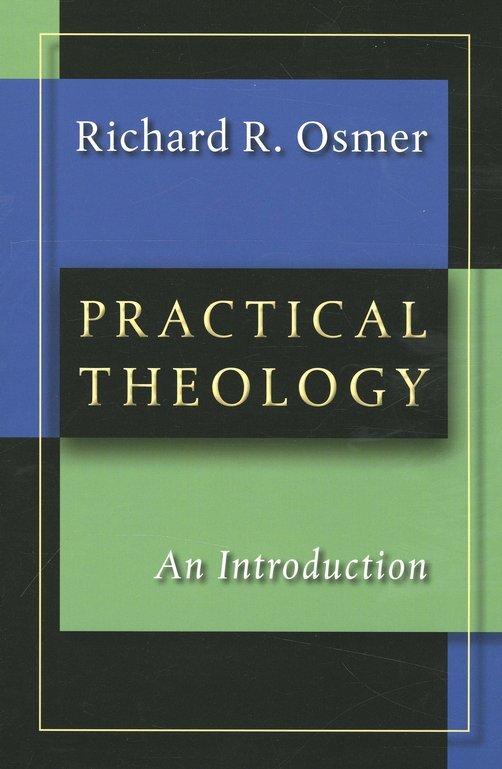Richard R. Osmer, Practical Theology: An Introduction. Eerdmans, 2008.
Referenced in: Pastoral Theology
LifeandLeadership.com Summary
While the title says “practical theology,” it is more pastoral theology in the sense that is adopted by LifeandLeadership.com (reflective of the historic German Protestant tradition, cf. Woodward and Patton, The Blackwell Reader on Pastoral Theology). Not all would draw a distinction between the two, but the literature of the field usually manifests a difference of emphases. Practical theology, sometimes called “applied theology,” seeks to apply the classical theological truths of Christianity to the thoughtful engagement of life-concerns and the practices of the Christian church such as worship, mission, preaching, etc. Pastoral theology is a kind of practical theology, but with a narrower focus on the role of Christian leaders. As “pastoral” theology,” it conveys the process and results of reflecting theologically on work of “shepherding” the flock. Authors often use the terms practical and pastoral theology interchangeably, and there is enough common ground between them to merit this. But when categorizing the literature, especially that which comes from the U.S., it often helps to separate them.
Osmer provides meaning to the practice of ministry by harkening back to the way God provided Israel with leaders over the course of his unfolding covenant relationship. He says:
“God provides Israel with leaders, anointed with the Spirit of God, to help it live with covenant fidelity. Priests play a special role in Israel’s worship of God, overseeing the cult of offering sacrifices to God on the people’s behalf. Judges, sages, and kings provide leadership in the organization of the covenant community, offering wise teachings, settling disputes guiding its political affairs, and protecting it against external threats. Prophets speak God’s word to Israel, announcing divine judgment when it strays from covenant fidelity, calling it to repent, and offering hope if it returns back to God.” (28)
He says the New Testament builds on these images, first by presenting Christ as the true priest, king, and prophet who fulfills, personifies, and transforms each of these offices. Based on this, the Reformers traditionally emphasized this threefold office of Christ. In keeping with this tradition, Osmer uses these three images to construct a pastoral theology of congregational leadership. He lays this out in four chapters (summarized on p. 28):
- The Descriptive-Empirical Task (or “What is going on?”): Priestly Listening, or “What is going on?” – This is grounded in a theology of presence, attending to others in their particularity within the presence of God.
- The Interpretive Task (or “Why is this going on?”): Sagely Wisdom – This is grounded in a spirituality of sagely wisdom: guiding others in how to live within God’s royal rule.
- The Normative Task (or “What ought to be going on?”): Prophetic Discernment – This is grounded in a spirituality of discernment, helping othes hear and heed God’s Word in the particular circumstances of their lives and world.
- The Pragmatic Task (or “How might we respond?”): Servant Leadership – This is grounded in a spirituality of servant leadership, taking risks on behalf of the congregation to help it better embody its mission as a sign and witness of God’s self-giving love.
To say that each of these roles is a “spirituality of…” conveys that practicing them is more than a matter of skills and competence, but a kind of reliance on the guidance of the Holy Spirit.
Osmer closes with a lengthy essay on how to teach practical theology in school of theology. It is quite good for those engaged in this work.
From the Publisher
Every church congregation encounters challenging situations, some the same the world over, and others specific to each church. Richard Osmer here seeks to teach congregational leaders—-including, but not limited to, clergy—-the requisite knowledge and skills to meet such situations with sensitivity and creativity.
Osmer develops a framework for practical theological interpretation in congregations by focusing on four key questions: What is going on in a given context? Why is this going on? What ought to be going on? and How might the leader shape the context to better embody Christian witness and mission?
The book is unique in its attention to interdisciplinary issues and the ways that theological reflection is grounded in the spirituality of leaders. Useful, accessible, and lively—-with lots of specific examples and case studies – Osmer’s Practical Theology effectively equips congregational leaders to guide their communities with theological integrity.
About the Author
Richard Robert Osmer is Thomas W. Synnott Professor of Christian Education and Director of the School of Christian Education at Princeton Theological Seminary in Princeton, New Jersey.
***For additional information on this resource, including reviews, click the bookstore links. Check the reference at page top or the links below for resource guides on related topics.***
See Other Resource Guides on Pastoral Theology:
- Minister Self-Care
- Ministry Burnout, Prevening and Overcoming
- Ministry Ethics
- Ministry Support Systems
- Strengthening and Renewing the Ministry Call
- Theology of Mission and Ministry
See Resources on Over 100 Ministry Topics:


